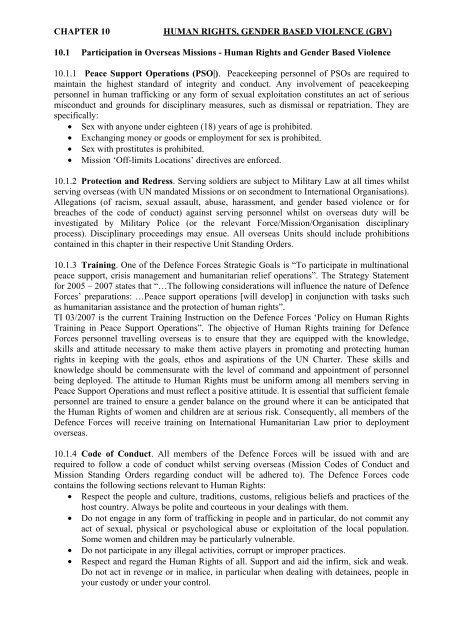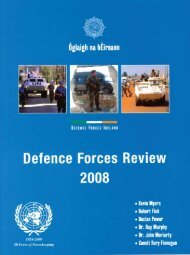Defence Forces Equality, Diversity, and Equal Status Policies 2007
Defence Forces Equality, Diversity, and Equal Status Policies 2007
Defence Forces Equality, Diversity, and Equal Status Policies 2007
Create successful ePaper yourself
Turn your PDF publications into a flip-book with our unique Google optimized e-Paper software.
CHAPTER 10<br />
HUMAN RIGHTS, GENDER BASED VIOLENCE (GBV)<br />
10.1 Participation in Overseas Missions - Human Rights <strong>and</strong> Gender Based Violence<br />
10.1.1 Peace Support Operations (PSO|). Peacekeeping personnel of PSOs are required to<br />
maintain the highest st<strong>and</strong>ard of integrity <strong>and</strong> conduct. Any involvement of peacekeeping<br />
personnel in human trafficking or any form of sexual exploitation constitutes an act of serious<br />
misconduct <strong>and</strong> grounds for disciplinary measures, such as dismissal or repatriation. They are<br />
specifically:<br />
• Sex with anyone under eighteen (18) years of age is prohibited.<br />
• Exchanging money or goods or employment for sex is prohibited.<br />
• Sex with prostitutes is prohibited.<br />
• Mission ‘Off-limits Locations’ directives are enforced.<br />
10.1.2 Protection <strong>and</strong> Redress. Serving soldiers are subject to Military Law at all times whilst<br />
serving overseas (with UN m<strong>and</strong>ated Missions or on secondment to International Organisations).<br />
Allegations (of racism, sexual assault, abuse, harassment, <strong>and</strong> gender based violence or for<br />
breaches of the code of conduct) against serving personnel whilst on overseas duty will be<br />
investigated by Military Police (or the relevant Force/Mission/Organisation disciplinary<br />
process). Disciplinary proceedings may ensue. All overseas Units should include prohibitions<br />
contained in this chapter in their respective Unit St<strong>and</strong>ing Orders.<br />
10.1.3 Training. One of the <strong>Defence</strong> <strong>Forces</strong> Strategic Goals is “To participate in multinational<br />
peace support, crisis management <strong>and</strong> humanitarian relief operations”. The Strategy Statement<br />
for 2005 – <strong>2007</strong> states that “…The following considerations will influence the nature of <strong>Defence</strong><br />
<strong>Forces</strong>’ preparations: …Peace support operations [will develop] in conjunction with tasks such<br />
as humanitarian assistance <strong>and</strong> the protection of human rights”.<br />
TI 03/<strong>2007</strong> is the current Training Instruction on the <strong>Defence</strong> <strong>Forces</strong> ‘Policy on Human Rights<br />
Training in Peace Support Operations”. The objective of Human Rights training for <strong>Defence</strong><br />
<strong>Forces</strong> personnel travelling overseas is to ensure that they are equipped with the knowledge,<br />
skills <strong>and</strong> attitude necessary to make them active players in promoting <strong>and</strong> protecting human<br />
rights in keeping with the goals, ethos <strong>and</strong> aspirations of the UN Charter. These skills <strong>and</strong><br />
knowledge should be commensurate with the level of comm<strong>and</strong> <strong>and</strong> appointment of personnel<br />
being deployed. The attitude to Human Rights must be uniform among all members serving in<br />
Peace Support Operations <strong>and</strong> must reflect a positive attitude. It is essential that sufficient female<br />
personnel are trained to ensure a gender balance on the ground where it can be anticipated that<br />
the Human Rights of women <strong>and</strong> children are at serious risk. Consequently, all members of the<br />
<strong>Defence</strong> <strong>Forces</strong> will receive training on International Humanitarian Law prior to deployment<br />
overseas.<br />
10.1.4 Code of Conduct. All members of the <strong>Defence</strong> <strong>Forces</strong> will be issued with <strong>and</strong> are<br />
required to follow a code of conduct whilst serving overseas (Mission Codes of Conduct <strong>and</strong><br />
Mission St<strong>and</strong>ing Orders regarding conduct will be adhered to). The <strong>Defence</strong> <strong>Forces</strong> code<br />
contains the following sections relevant to Human Rights:<br />
• Respect the people <strong>and</strong> culture, traditions, customs, religious beliefs <strong>and</strong> practices of the<br />
host country. Always be polite <strong>and</strong> courteous in your dealings with them.<br />
• Do not engage in any form of trafficking in people <strong>and</strong> in particular, do not commit any<br />
act of sexual, physical or psychological abuse or exploitation of the local population.<br />
Some women <strong>and</strong> children may be particularly vulnerable.<br />
• Do not participate in any illegal activities, corrupt or improper practices.<br />
• Respect <strong>and</strong> regard the Human Rights of all. Support <strong>and</strong> aid the infirm, sick <strong>and</strong> weak.<br />
Do not act in revenge or in malice, in particular when dealing with detainees, people in<br />
your custody or under your control.
















